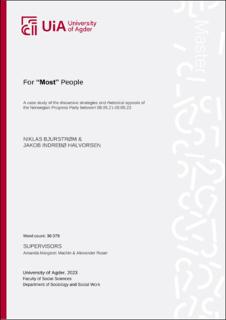| dc.description.abstract | This thesis is a rhetorical discourse analysis of FrP and party leader Sylvi Listhaug’s use of right-wing populist discursive strategies and rhetorical tools in Facebook posts between 08.05.21-08.05.23. This approach is used to understand how they are using populist discursive strategies on social media and to which degree social media as a platform can enable populist rhetoric and function to influence and manipulate the masses.
The theoretical approach to populism in this thesis bases itself in the discursive approaches of Laclau and Wodak and emphasises how the homogenising effects of empty and floating signifiers appear in the discursive strategies characteristic of right-wing populists and strengthen an equivalential chain.
The data material that is analysed consists of three posts from Listhaug’s personal Facebook account and three posts from FrP’s main party account, selected out of two data sets which gathered a total of 657 posts. Through a rhetorical discourse analysis, we identify discursive strategies employed by these two actors and analyse how rhetorical tools function to strengthen these.
In the discussion we then establish that Listhaug and FrP both make exemplary use of both discursive strategies and the rhetorical tools and have a highly populistic mode of articulation in the expression of their equivalential chain. On social media their discourse functions to unite its voters using empty and floating signifiers while forming an antagonistic relationship with the “elite”, oppositional parties, and the “others”, immigrants mainly of Muslim origin and those who do not conform with Norwegian tradition. This discourse is strengthened by their appeal to emotions, pathos, to strengthen both their credibility, ethos, and allow them to utilise common-sense lines of argumentation, logos.
Connected to their exemplary use of discursive strategies and rhetorical tools, we identify Listhaug being particularly prone to the accusation that she is using propaganda. Propaganda here in terms of manipulating the masses through language. In the context of this case, social media could therefore be said to enable populist rhetoric to a degree, but it is not without its limitations bound in the existence of discourse and challenging offline as well as online. | |
